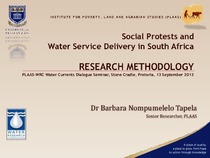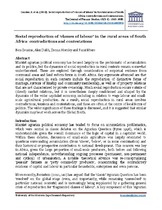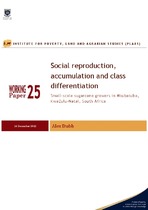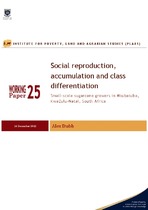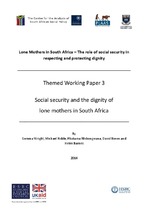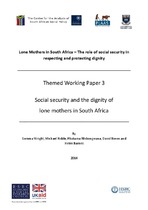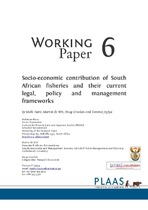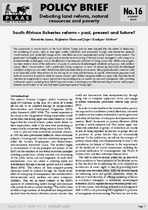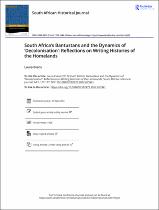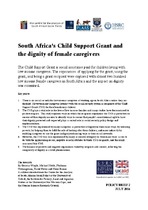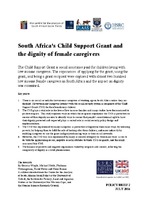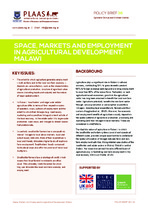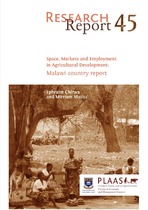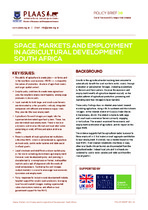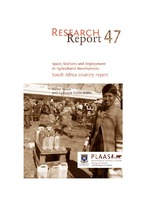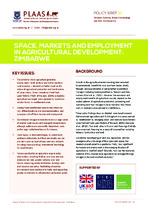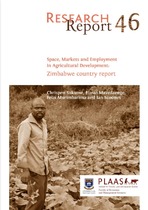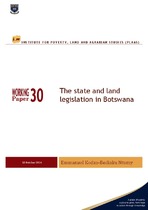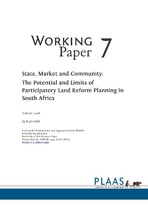Browsing Institute for Poverty, Land and Agrarian Studies (PLAAS) by Title
Now showing items 494-513 of 608
-
Social Protests and Water Service Delivery in South Africa
(2013-09-13)To develop: • Clear understandings of the linkage between social protests and water service delivery. • An evaluation framework to enable government, municipalities and other stakeholders to more effectively address ... -
Social reproduction of ‘classes of labour’ in the rural areas of South Africa: contradictions and contestations
(Taylor & Francis, 2018)Marxist agrarian political economy has focused largely on the problematic of accumulation and its politics, but the dynamics of social reproduction in rural contexts remain somewhat undertheorised. These are explored through ... -
Social reproduction, accumulation and class differentiation: Small-scale sugarcane growers in Mtubatuba, KwaZulu-Natal, South Africa
(Institute for Poverty, Land and Agrarian Studies, University of the Western Cape, 2012-12)This paper argues that the rise and decline of small-scale sugarcane grower (SSG) production in KwaZulu-Natal must be historically located within a changing structural relationship with miller-processors, in turn conditioned ... -
Social reproduction, accumulation and class differentiation: small-scale sugarcane growers in Mtubatuba, KwaZulu-Natal, South Africa
(PLAAS, University of the Western Cape, 2012)This paper argues that the rise and decline of small-scale sugarcane grower (SSG) production in KwaZulu-Natal must be historically located within a changing structural relationship with miller-processors, in turn conditioned ... -
Social security and the dignity of lone mothers in South Africa
(Institute for Poverty, Land and Agrarian Studies, University of the Western Cape, 2014)This working paper forms part of a project entitled ‘Lone Mothers in South Africa: The role of social security in respecting and protecting dignity’. The project originates from research undertaken for the South African ... -
Social security and the dignity of lone mothers in South Africa
(Institute for Poverty Land and Agrarian Studies (PLAAS), 2014)This working paper forms part of a project entitled ‘Lone Mothers in South Africa: The role of social security in respecting and protecting dignity’. The project originates from research undertaken for the South African ... -
Socio-economic contribution of South African fisheries and their current legal, policy and management frameworks
(Institute for Poverty, Land and Agrarian Studies, University of the Western Cape, 2008)The Marine Living Resources Act (No. 18, 1998) establishes as an objective the utilisation of marine living resources to achieve, inter alia 'economic growth, human resource development, capacity building within fisheries ... -
South African fisheries reform – past, present and future?
(Institute for Poverty, Land and Agrarian Studies, University of the Western Cape, 2004)Two approaches to transformation of the South African fishery industry were adopted after the advent of democracy: the broadening of access rights to new rights holders (individuals and companies) through state intervention ... -
South Africa’s Bantustans and the dynamics of “decolonisation”: Reflections on writing histories of the homelands
(Taylor and Francis Group, 2012)From the late 1950s, as independent African polities replaced formal colonialrule in Africa, South Africa’s white minority regime set about its own policy ofmimicry in the promotion of self-governing homelands, which ... -
South Africa’s Child Support Grant and the dignity of female caregivers
(Institute for Poverty, Land and Agrarian Studies, University of the Western Cape, 2014)The Child Support Grant (CSG) is social assistance for children with low income caregivers. It is currently paid at the rate of R310 per month and there are more than 11 million child beneficiaries. Almost all (98%) of ... -
South Africa’s Child Support Grant and the dignity of female caregivers
(Institute for Poverty Land and Agrarian Studies (PLAAS), 2014)The Child Support Grant is social assistance paid for children living with low income caregivers. The experiences of applying for the grant, using the grant, and being a grant recipient were explored with almost two hundred ... -
Space, markets and employment in agricultural development: Malawi
(Institute for Poverty, Land and Agrarian Studies, University of the Western Cape, 2015)Agriculture plays a significant role in Malawi’s national economy, contributing 35% to gross domestic product, 90% to foreign exchange earnings and providing employment to more than 80% of the labour force. Particularly ... -
Space, markets and employment in agricultural development: Malawi country report
(Institute for Poverty, Land and Agrarian Studies, University of the Western Cape, 2015)There is a growing literature on the links between farm and non-farm employment activities in rural societies and the important roles played by rural non-farm employment in poverty reduction (Lanjouw, 2001; Davis et al., ... -
Space, markets and employment in agricultural development: South Africa
(Institute for Poverty, Land and Agrarian Studies, University of the Western Cape, 2015)Growth in the agricultural sector has long been assumed to automatically benefit the rural non-farm sector, mainly through production or consumption ‘linkages’, including expenditure by farmers and their workers. However ... -
Space, markets and employment in agricultural development: South Africa country report
(Institute for Poverty, Land and Agrarian Studies, University of the Western Cape, 2015)Throughout much of the developing world, including sub-Saharan Africa, agriculture is frequently viewed as central to efforts to foster development and reduce poverty. Key conceptual and policy issues accordingly raised ... -
Space, markets and employment in agricultural development: Zimbabwe
(Institute for Poverty, Land and Agrarian Studies, University of the Western Cape, 2015)Growth in the agricultural sector has long been assumed to automatically benefit the rural non-farm sector, chiefly through various production or consumption expenditure ‘linkages’ including local expenditure by farmers ... -
Space, markets and employment in agricultural development: Zimbabwe country report
(Institute for Poverty, Land and Agrarian Studies, University of the Western Cape, 2015)Since independence in 1980, Zimbabwe has undergone several phases of land redistribution, generally to communal and working people. The latest phase was the Fast-Track Land Reform Programme (FTLRP), which began in 2000 ... -
The state and land legislation in Botswana
(Institute for Poverty, Land and Agrarian Studies, University of the Western Cape, 2014-10)This paper aims to understand the political and legal dynamics involved in aspects of local government in Botswana as exemplified by legislative enactments. Mawhood (1985) suggests that such structures are charged with ... -
State, market and community: The potential and limits of participatory land reform planning in South Africa
(Institute for Poverty, Land and Agrarian Studies, University of the Western Cape, 2008-10)Market-assisted land reform, as promoted by the World Bank, has made little progress in South Africa: since the advent of democracy in 1994, just 4 per cent of white-owned agricultural land has been redistributed to black ... -
State, market or the worst of both? Experimenting with market-based land reform In South Africa
(Institute for Poverty Land and Agrarian Studies (PLAAS), 2007)The concept of ‘market-based land reform’ (MBLR, also market-assisted land reform, or market-led agrarian reform) has been central to the ‘new wave’ of land reform that has been in evidence internationally since the early ...

